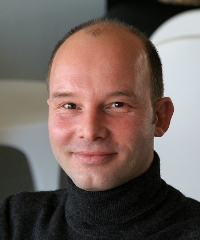Dr. Thomas Schäfer
(<strong>Profesor IKERBASQUE, grupo de investigación:</strong> Ciencia de los polímeros)

Dirección web
Biografía
Thomas Schäfer initiated his studies in chemical engineering at the Friedrich-Alexander University of Erlangen-Nürnberg (Germany) and graduated as a chemical engineer from the Technical University Hamburg-Harburg (Germany) in 1994 with special focus on biotechnological processes and animal cell culture. After research stays at the University of Wageningen (The Netherlands) and the UNESCO Centre for Membrane Science and Technology of the University of New South Wales (Australia), he followed his PhD studies at the Universidade Nova de Lisboa (Portugal) where he obtained his degree in 2002 on the recovery of aroma compounds from wine-must by pervaporation. During the following two years, he conducted post-doctoral research on monitoring and characterizing interfacial mass transport phenomena occurring in membranes using confocal laser and Raman microscopy, along with a collaboration with the University of Siena (Italy) on the use of membranes for enhancing the performance of artificial olfactory systems ("electronic noses"). From 2004-2006 he worked as a research assistant at the University of Pisa (Italy) dealing with membranes and ionic liquids in sensor systems, and in 2007 he obtained a "Ramón y Cajal"- research fellowship at the Universitat Rovira i Virgili (Spain). In 2009 he became an Ikerbasque Research Professor at the Institute for Polymer Materials (POLYMAT) of the University of the Basque Country where he is now setting up a group on novel nanocomposites and stimuli-responsive materials for sensors and separations (NanoBioSeparations Group).
Investigación
His research interests are creating novel nanostructured interfaces with improved selectivity, flexibility and tunability based on environmentally benign materials such as ionic liquids, and in combination with highly selective biological molecules, with applications in cleaner separation (hybrid) processes, biotechnology, biomedicine and dedicated sensing techniques. He also remains active in the use of membranes for obtaining natural aroma concentrates of high complexity and organoleptic value.
Publicaciones
He has 25 papers and book chapters and has been awarded an starting grant during the first call of the European Reseach Council's IDEAS-programme.
<ul><li><a href="https://www.ehu.eus/web/polymat/polymer-science-publications">Más publicaciones</a></li></ul>

